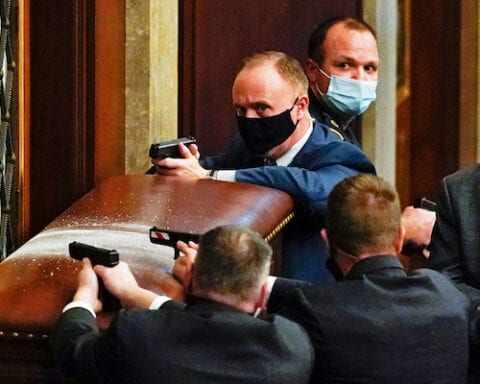| WASHINGTON, D.C. (LC)
Neil Gorsuch, 49, was sworn in on Monday as a justice of the U.S. Supreme Court. President Trump commented as he swore in Gorsuch in the White House rose garden, “I got it done in the first 100 days.” Trump said, “You think that’s easy?” Gorsuch will be the 113th justice on the court and will fill the seat held by Justice Antonin Scalia. Gorsuch, a conservative, is a proponent of the judicial philosophy of “originalism,” which Scalia popularized. Originalism is the theory that the words in the Constitution should be interpreted as they were understood at the time they were written.
On Thursday, Democrats had blocked a U.S. Senate confirmation vote. With a 55-45 tally, Republicans fell short of the 60-vote super-majority needed with the previous rules to defeat a filibuster. “This will be the first and last partisan filibuster of the Supreme Court,” Republican Senate Majority Leader Mitch McConnell said on the Senate floor on Thursday. Republicans were able to deploy a rule change immediately after the vote, the “nuclear option,” to break the Democratic filibuster. Republicans hold a 52-48 Senate majority, and when the new vote was held on Friday, he was confirmed.
Democrats have argued that the move will increase partisanship, and weaken the U.S. democracy.
“In 20 or 30 or 40 years, we will sadly point to today as a turning point in the history of the Senate and the Supreme Court, a day when we irrevocably moved further away from the principles our founders intended for these institutions: principles of bipartisanship, moderation and consensus,” Senate Democrat leader Chuck Schumer said on the Senate floor.
Senators Heidi Heitkamp (D-ND), Joe Manchin (D-WV) and Joe Donnelly (D-IN), were the only three Democrats who voted for Gorsuch.
Gorsuch won’t initially preside over any cases that have already heard oral argument, unless the Court schedules such cases for rehearing next fall. Gorsuch will preside over the final 13 cases of the term during the Court’s April sitting. Some cases that will come before Gorsuch include:
Trinity Lutheran Church v. Comer (church denied state funding for playground; religious-freedom: Issue: Whether the exclusion of churches from an otherwise neutral and secular aid program violates the Free Exercise and Equal Protection Clauses when the state has no valid Establishment Clause concern.);
Masterpiece Cake Shop v. Colorado Civil Rights Commission (refusal to bake cake for gay couple, religious-freedom, LGBT rights: Issue: Whether applying Colorado’s public accommodations law to compel the petitioner to create expression that violates his sincerely held religious beliefs about marriage violates the free speech or free exercise clauses of the First Amendment.);
Alaska Oil and Gas Association v. Zinke (polar bear case: Issue: Whether the U.S. Court of Appeals for the 9th Circuit’s exceedingly permissive standard improperly allows the U.S. Fish and Wildlife Service to designate huge geographic areas as “critical habitat” under the Endangered Species Act when much of the designated area fails to meet the statutory criteria.);
Peruta v. California (right to carry concealed firearm in public: Issue: Whether the Second Amendment entitles ordinary, law-abiding citizens to carry handguns outside the home for self-defense in some manner, including concealed carry when open carry is forbidden by state law.);
Maslenjak v. U.S. (immigration/citizenship: Issue: Whether the U.S. Court of Appeals for the 6th Circuit erred by holding, in direct conflict with the U.S. Courts of Appeals for the 1st, 4th, 7th and 9th Circuits, that a naturalized American citizen can be stripped of her citizenship in a criminal proceeding based on an immaterial false statement.);
Weaver v. Massachusetts and Davila v. Davis (Sixth Amendment, right to a speedy and public trial: Issue: Whether a defendant asserting ineffective assistance that results in a structural error must, in addition to demonstrating deficient performance, show that he was prejudiced by counsel’s ineffectiveness, as held by four circuits and five state courts of last resort; or whether prejudice is presumed in such cases, as held by four other circuits and two state high courts.).
+++END
LIMA CHARLIE NEWS, NEW YORK BUREAU
1302 ZULU APR11 2017
(REUTERS, THE WASHINGTON POST, PBS NEWS AND THE ATLANTIC CONTRIBUTED WITH INFORMATION TO THIS REPORT)
[Image: Reuters]
Lima Charlie provides global news, insight & analysis by military veterans and service members Worldwide.
For up-to-date news, please follow us on twitter at @LimaCharlieNews





![Image Memorial Day may soon be a remembrance of democracy and those who had the courage to defend it [Lima Charlie News]](https://limacharlienews.com/wp-content/uploads/2018/05/Memorial-Day-may-soon-be-a-remembrance-of-democracy-and-those-who-had-the-courage-to-defend-it-Lima-Charlie-News-480x384.png)
![The Mind of Bolton - AUMF and the New Iran War [Lima Charlie News]](https://limacharlienews.com/wp-content/uploads/2019/05/Inside-the-mind-of-Bolton-Lima-Charlie-News-main-01-480x384.png)